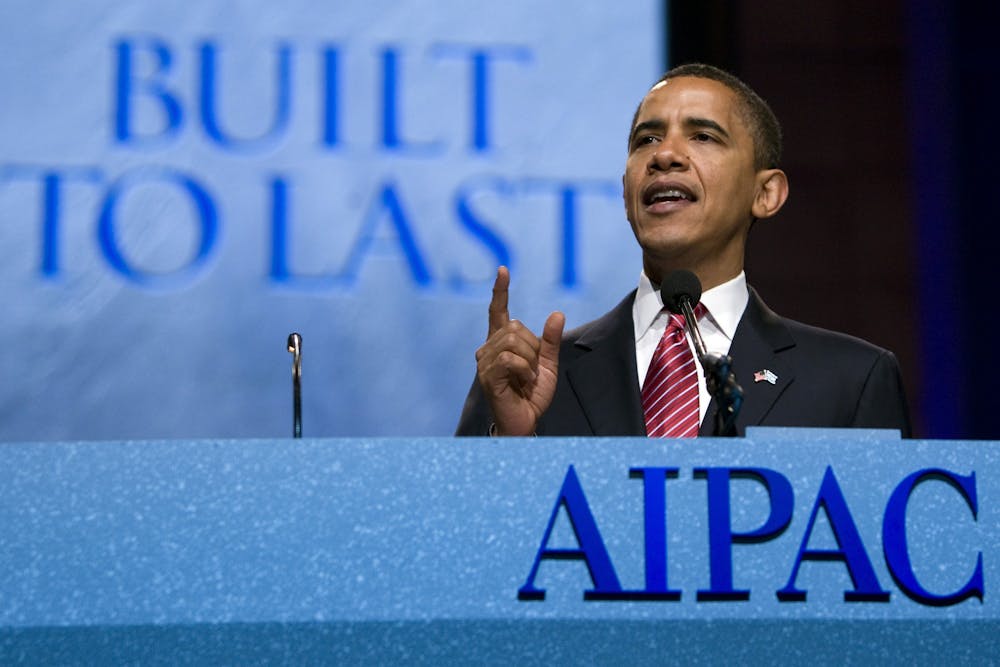As the annual policy conference beginning Mar. 1 for the American-Israel Public Affairs Committee, or AIPAC, draws near, public pressure is mounting for Democratic hopefuls to boycott the event typically frequented by national political figures.
America’s uncritical support for Israeli oppression of Palestinians has long been part of the bipartisan consensus, but has become a key issue for progressives.
Since 1967, the U.S. has played a key role in enabling Israel’s violent behavior toward the Palestinian people. Currently, the U.S. provides $3.8 billion in annual aid to Israel. That accounts for roughly 23% of Israel’s military budget. The Israeli military is the main apparatus keeping Palestinians in subjugation.
One of the main factors driving U.S. support for Israel is the considerable lobby the country maintains in the U.S. The Israel lobby is an informal array of Jewish, neoconservative and Christian Zionist organizations and individuals who share the desire to orient U.S. foreign policy towards the state of Israel.
Former Rep. Lee Hamilton, namesake of the Hamilton Lugar International Studies building, once said of the Israel Lobby, "There’s no lobby group that matches it...they’re in a class by themselves."
AIPAC is one of the most visible and most important linchpins of this network. Through the extensive network, the lobby is able to exert pressure on politicians through campaign funding, lobbying efforts and public relations campaigns.
In its quest to promote an Israeli orientation in U.S. foreign policy, the group leverages anti-Arab and anti-Muslim sentiment to generate sympathy for the most western-oriented Middle Eastern state.
In the past, the conference has touted the presence of noted Islamophobes such as Steven Emerson, who regularly spreads the racist myth of American cities taken over by sharia law, and Frank Gaffney who invoked fears of a Muslim “stealth jihad” in U.S. cities.
As the left wing of the Democratic party brings voices of marginalized groups into the mainstream, progressives have begun to include the plight of the Palestinians as one of their key issues.
Last year, the pro-peace organization MoveOn called on Democratic candidates to boycott the AIPAC Policy Conference, citing AIPAC’s promotion of Islamophobia, efforts to oppose the Iran Nuclear Deal and the ongoing antagonism to Palestinian rights.
Typically, the AIPAC Policy Conference is a bipartisan affair. At last year’s conference, many of the speakers, from Israelis to Republicans to Democrats spent time attacking Rep. Ilhan Omar, D-MN, who had just been the center of controversy after calling attention to the lobby’s role in policy making. Senate Minority Leader Chuck Schumer compared Omar’s criticism of AIPAC to Trump’s support for neo-Nazis.
Despite this, several of the Democratic hopefuls including Sen. Bernie Sanders, I-VT, Sen. Elizabeth Warren, D-MA, and former South Bend, Indiana mayor Pete Buttigieg did not attend the conference last year. Sen. Kamala Harris, D-CA, who was still running for President at the time, did not appear at the conference but instead hosted an AIPAC delegation in her senate office.
This year, another pro-peace group, IfNotNow, is calling on candidates to boycott. So far, only Warren has said she would boycott. Sanders said previously during a town hall that he has “no objection to going,” but is not currently planning to do so. There is little indication as to the intentions of other contenders.
Sanders and the rest of the Democratic field should follow Warren’s lead and actively boycott the AIPAC conference. AIPAC is at the head of a campaign to promote the dehumanization and the subjugation of the Palestinian people, and in carrying out this mission, it spreads racist hatred against Muslims and Arabs. Such an organization has no place in the future of progressive politics.
Bryce Greene (he/him) is a senior studying informatics and is the president of the Palestinian Solidarity Committee at IU. First and foremost, he is a citizen of the world.






